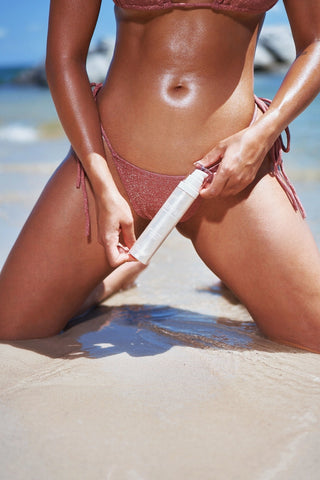Not Another Skincare Blog
by Colin Velez
We get it, the internet is flooded with recommendations for treating and protecting your skin. From hobbyist tutorials to celebrity masterclasses, the sheer deluge of fact and fiction can daunt anyone simply looking to find the right combination of ingredients. Thankfully, daily skincare do's and dont's are as straightforward as they come. So set aside the tea-tree oil and foaming-charcoal masks, and get ready for all you need to know to keep your skin healthy during swim season.

When it comes to skincare, marketing and falsehoods have diluted the truth. At the end of the day, you should always do what works best for you and your skin. However, to help you find what's best, let's cover the basics of skincare.
The standard Routine
Step 1 Cleanse: Dermatologists agree that daily cleansing of the skin is is important for washing away dirt, makeup and dead cells. While you can use body wash for your body, use a gentle cleanser for your face instead, especially if you have sensitive skin. People with eczema may want to cleanse with water and small amounts of soap only, as many products will simply irritate any rashes already present. If you do have dry or damaged skin, be sure to avoid fragrances and unnecessary ingredients, as they can further irritate rashes and burns.
Step 2 Moisturize: As you might have guessed, moisturizers keep the skin water-logged, maintaining texture and preventing dryness. You can look for ingredients classified as humectants, such as hyaluronic acid, to pull moisture into your skin, or ingredients called emollients, like petroleum jelly, to lock moisture in. However, most moisturizers require the skin to be damp in order to work, meaning you should always apply as soon as you get out of the shower, and avoid using them when dry. Moisturizing is a whole body process, so make sure to cover your limbs, torso, hips and face.
Step 3 Treat Skin: After moisturizing, you can apply elements to improve the look and longevity of your face's skin. While it's always best to do your own research, two areas many people struggle with are wrinkle-management and hyperpigmentation. Most people will find products containing retinol will help smooth out wrinkles, or prevent them from appearing. However, retinoids may have a difficult adjustment period, as their initial effects dries out the surface of your face. On the other hand, hyperpigmentation, areas of the body which are discolored, is more difficult to treat, especially if you have darker skin. While there are products that can potentially help, it is best to see a dermatologist or specialist to help you establish a routine or find a procedure.
Step 4 Apply Sunscreen: If your routine is in the morning, this should be the last thing you apply, although you can skip it at night. The sun is the biggest threat to your skin in the long term, as UV rays can break down your cellular structure, increasing your risk of cancer and wrinkles. Wearing sunscreen with an SPF of 30 will guarantee your skin is protected.

Things to avoid
It's easy to miss the #ad on some instagram posts, causing one to get swept up in the hype of a new product. While there's no way to confirm or deny some of the bolder beauty fads on the internet, there are practices and products that scientists and experts agree should be avoided, whether due to harmful side effects or a lack of empirical evidence to support dubious claims.
Masks: While masks can potentially moisturize and treat skin, they are almost universally regarded as a waste of money by experts, and many brands overstate and exaggerate the benefits of their products. This extends to the strange rubbery masks, foaming masks, and even the stereotypical cream and cucumber combination. Despite their advertising, masks will not fight aging, and will not preserve the skin, especially if the other steps mentioned here aren't followed.
Face Brushes: While you should still use a cleanser, you should avoid scrubbing your face, as it can strip away the natural oils which balance the chemistry of your skin. And if you're worried about acne, you can actually make your acne worse if your pores are kept open for debris or contaminants to crawl in.
Dietary Supplements: While there is certainly debate on the validity of using vitamins and supplements to improve wellbeing, the fact is that most experts agree that nutrition should come solely from what you eat. If you're looking to be healthier in the hopes that it will help your skin in the long term, aim for veggies, legumes, whole grains and fruit, and skip the suspicious gummies at the pharmacy.
What Products To Try
So now that you know what is and isn't recommended, what exactly should you spend your money on? While we can't tell you which brands are the best, we can tell you what products you should look for.
Moisturizing SPF: Combining sunscreen and moisturizer, these products keep your skin protected and healthy. Many brands offer these combo treatments, so look for them on your nearest shelves to keep your routine short.

We hope you feel better prepared to face the summer sun. Your skin will look smooth, and your future self will thank you!